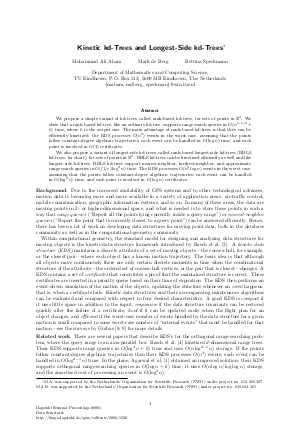Kinetic kd-Trees and Longest-Side kd-Trees
Authors Mohammad Abam, Mark de Berg, Bettina Speckmann
-
Part of:
Volume:
Dagstuhl Seminar Proceedings, Volume 8081
Part of: Series: Dagstuhl Seminar Proceedings (DagSemProc) - License:
 Creative Commons Attribution 4.0 International license
Creative Commons Attribution 4.0 International license
- Publication Date: 2008-06-16
File

PDF
DagSemProc.08081.2.pdf
- Filesize: 241 kB
- 12 pages
Document Identifiers
Subject Classification
Keywords
- Kinetic data structures
- kd-tree
- longest-side kd-tree
Metrics
- Access Statistics
-
Total Accesses (updated on a weekly basis)
0PDF Downloads0Metadata Views
Abstract
We propose a simple variant of kd-trees, called rank-based kd-trees, for sets of points in~$Reals^d$.
We show that a rank-based kd-tree, like an ordinary kd-tree, supports range search que-ries in~$O(n^{1-1/d}+k)$ time,
where~$k$ is the output size. The main advantage of rank-based kd-trees is that they can be efficiently kinetized:
the KDS processes~$O(n^2)$ events in the worst case, assuming that the points follow constant-degree algebraic trajectories,
each event can be handled in~$O(log n)$ time, and each point is involved in~$O(1)$ certificates.
We also propose a variant of longest-side kd-trees, called rank-based longest-side kd-trees (RBLS kd-trees, for short),
for sets of points in~$Reals^2$. RBLS kd-trees can be kinetized efficiently as well and like longest-side kd-trees,
RBLS kd-trees support nearest-neighbor, farthest-neighbor, and approximate range search queries in~$O((1/epsilon)log^2 n)$ time.
The KDS processes~$O(n^3log n)$ events in the worst case, assuming that the points follow constant-degree algebraic trajectories;
each event can be handled in~$O(log^2 n)$ time, and each point is involved in~$O(log n)$ certificates.
Cite As Get BibTex
Mohammad Abam, Mark de Berg, and Bettina Speckmann. Kinetic kd-Trees and Longest-Side kd-Trees. In Data Structures. Dagstuhl Seminar Proceedings, Volume 8081, pp. 1-12, Schloss Dagstuhl – Leibniz-Zentrum für Informatik (2008)
https://doi.org/10.4230/DagSemProc.08081.2
BibTex
@InProceedings{abam_et_al:DagSemProc.08081.2,
author = {Abam, Mohammad and de Berg, Mark and Speckmann, Bettina},
title = {{Kinetic kd-Trees and Longest-Side kd-Trees}},
booktitle = {Data Structures},
pages = {1--12},
series = {Dagstuhl Seminar Proceedings (DagSemProc)},
ISSN = {1862-4405},
year = {2008},
volume = {8081},
editor = {Lars Arge and Robert Sedgewick and Raimund Seidel},
publisher = {Schloss Dagstuhl -- Leibniz-Zentrum f{\"u}r Informatik},
address = {Dagstuhl, Germany},
URL = {https://drops.dagstuhl.de/entities/document/10.4230/DagSemProc.08081.2},
URN = {urn:nbn:de:0030-drops-15307},
doi = {10.4230/DagSemProc.08081.2},
annote = {Keywords: Kinetic data structures, kd-tree, longest-side kd-tree}
}
